Search Results
Search Term: cambodia china
Number of Results: 213
Beware Cambodia’s Europe Sanctions Hype
Beware Cambodia’s Europe Sanctions Hype
Claims of threats to the country’s sovereignty are vastly exaggerated and miss the broader point about how foreign economic relations work.
Op-Ed: The Diplomat
By David Hutt January 30, 2019
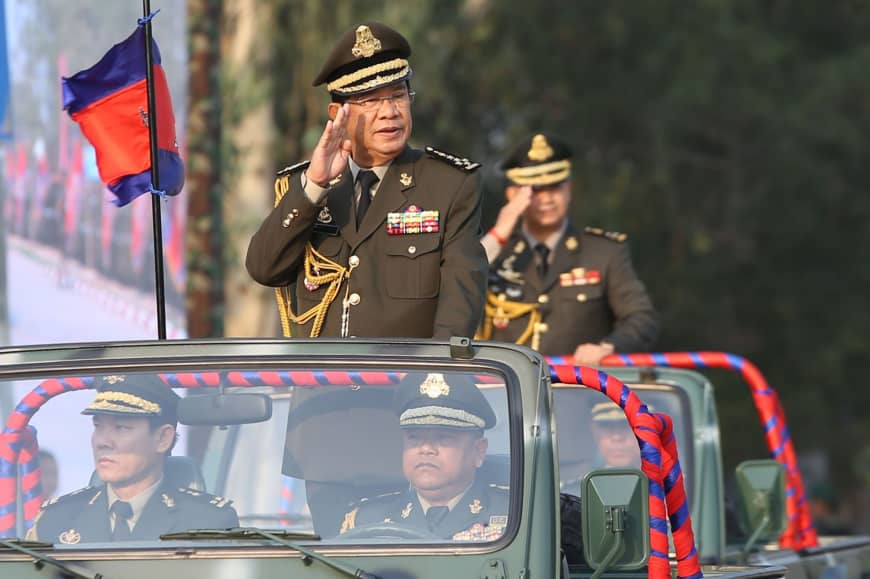
For the last 18 months, the Cambodian government has seen foreign conspiracies everywhere it looks. The largest opposition party, the Cambodia National Rescue Party (CNRP), was plotting a coup with American backing, the government says, and was summarily dissolved by the Supreme Court in November 2017 as a result. The CNRP’s president, Kem Sokha, was also arrested for “treason,” though the government gave scant evidence of this.
The list goes on. Two reporters for Radio Free Asia were charged with espionage in late 2017. An Australian filmmaker was convicted as a “spy” for filming a CNRP rally. There are numerous other instances of the government’s myopic mirages of Cambodians, from senior opposition politicians to jaded social media users, who are plotting its downfall.
Amid this, the ruling Cambodian People’s Party (CPP) – which came in power in 1979 thanks, ironically, largely to the support of the Vietnamese military in ousting the genocidal Khmer Rouge – claims that it is the protector of peace and stability, and the only guarantor of Cambodia’s national sovereignty and independence.
Cambodia’s sovereignty, it says, is now also at stake as the European Union (EU) threatens to remove Cambodia from a preferential trade deal, unless the CPP’s political chokehold loosens. This is important. Under the Everything But Arms (EBA) scheme, which grants most Cambodian exports into Europe duty-free status, Cambodia exported roughly $5.8 billion worth of goods to the EU in 2017, making Europe its largest export market and main purchaser of its most profitable products, garments and footwear.
The government’s response to possible sanctions has oscillated between victimhood and vainglory, between saying Cambodia’s economy won’t be too badly affected by the EBA’s withdrawal and saying that if the EU goes ahead with its threat, it will destroy of livelihoods of millions of Cambodians, mostly the poor. Naturally enough, the government has been steadfast in calling possible sanctions an assault on Cambodia’s national sovereignty and independence.
In reality, however, all the EU is doing is reaffirming the conditions of a benevolent trade scheme that explicitly stipulates standards on democracy, human rights, and a free society as previsions for membership. The Cambodian government doesn’t have to accept the EU’s demands, of course. Brussels isn’t threatening to physically intervene in Cambodia. Indeed, the choice is clear: The Cambodian government can do what it likes, just not if it wants the trade benefits Europe offers — and which happen to prop up Cambodia’s export-driven economy.
Prime Minister Hun Sen has recently responded with his own violent ultimatum. “If you want the opposition dead, just cut it,” he said earlier this month, referring to the EBA’s withdrawal and the death of the CNRP. “If you want the opposition alive, don’t do it and come and hold talks together.” But he stands to lose much more.
Despite the Cambodian government’s perception of hostility, is the EU’s position different from any other trade deal? When China offers Cambodia millions of dollars’ worth of loans (which is has on numerous occasions, including $600 million just last week) they come with conditions, obviously. China doesn’t say that the Cambodian government can set whatever terms it likes and then Beijing will blindly comply. No, Beijing states what amount should be paid back, with how much interest, and when, among many other conditions, some of which are controversial.
And, importantly, in order to meet these repayments, the Cambodian government must change its domestic policy. So that its national debt doesn’t grow too costly and there is enough money to make loan repayments, the government modifies its budget; it must curb spending so that it has enough capital to repay the debt. Is this an affront to Cambodia’s sovereignty? Most people, correctly, think not.
Read More …Cambodia Ruler’s Recipe for Youth Appeal? An 8,900-Pound Rice Cake
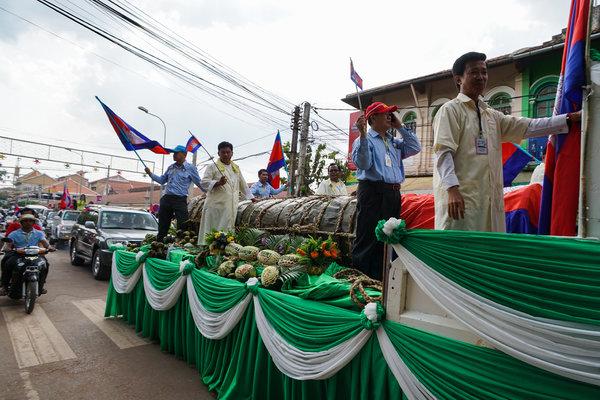
By Julia Wallace
Op-Ed: The New York Time
សេចក្តីវង្វេងក្នុងអំណាចនឹងការបោកប្រាស់ប្រជារាស្ត្រតាមរយៈការសម្ញែងនិងអូសទាញយុវជនអោយជ្រុលជ្រើមវត្ថុទាំងនេះដូចជាអន្សមយក្ស ក្រម៉ាយក្ស និងទូកយក្សជាដើម មិនមាននិរន្តរភាពយូរអង្វែងទេ។ កូនៗទាំងអស់ ដែលបានសិក្សារៀនសូត្រពីបច្ចឹមប្រទេស មិនបានយកចំណេះដឹងនិងក្រមសីលធម៍ពីបច្ចឹមប្រទេសមកកែទម្រង់ប្រទេសជាតិខ្លួនឡើយ។ ផ្ទុយទៅវិញម្នាក់ៗគ្មានក្រមសីលធម៍និងគ្មានវិជ្ជាជីវៈក្នុងខ្លួនសោះឡើយ។ កូនមួយជាមេទ័ពរបស់ជាតិ បែរជារំលោភលើក្រិតក្រមទ័ពមកបម្រើនយោបាយបក្សនិងធ្វើខ្លួនឯងជាសេនាធិការនយោបាយ។ កូនម្នាក់ទៀត លើកបន្តុបជាមេសមាគមយុវជន ដែលមិនមានក្រមវិន័យច្បាស់លាស់ថាជាសមាគមក្រៅរដ្ឋាភិបាល(NGO)ឬជាសមាគមអោយគណបក្សពីព្រោះខ្លួនគឺជាតំណាងរាស្ត្រម្នាក់របស់គណបក្ស តែធ្វើខ្លួនជាប្រធានសមាគមក្រៅរដ្ឋាភិបាល។ ដូចដែលពត៍មាននេះបានលំអិត គឺខ្លួនខិតខំសាបព្រោះមនោគមវិជ្ជាលើយុវជនច្រើនជាងបង្កើតគ្រឹះដល់យុវជនសំរាប់ជាធនធានមនុស្សរបស់ជាតិទៅអនាគត។ មិនតែប៉ុណ្ណោះ កូនចៅនិងសាច់ញាតិទាំងអស់គឺជាមេជំនួញនិងប្រធានអង្គការធំៗមានកាកបាទក្រហមជាដើម ដែលប្រការនេះគឺមានទំនាស់ផលប្រយោជន៌(conflict of interest) រំលោភអំណាច(power abuses) និងវិជ្ជាជីវៈជាតិ(national professionalism) ក៏ដូចជាសាបព្រោះគំរូស្មោគគ្រោកដល់ប្រទេសនេះជាខ្លាំង។
PHNOM PENH, Cambodia — First came the 8,900-pound sticky-rice cake, stuffed with mung beans and pork belly, displayed at Angkor Wat and heralded as “officially amazing” by Guinness World Records.
Then, in rapid succession, came a series of record-setting feats: The largest-ever performance of Madison dancing, with 2,015 participants. The world’s longest scarf (3,772 feet), woven over the course of six months and paraded through the streets of Phnom Penh, the Cambodian capital.
And in November, the world’s longest dragon boat (286 feet) was launched into the Mekong River and rowed by 179 oarsmen.
While this streak of oddball achievements might seem unconnected, they are all part of Prime Minister Hun Sen’s push to get young people excited about his aging regime, which he appears to consider essential to maintaining his grip on power.
“The government’s intentions here are rather transparent: They want to create images of visible enthusiasm for the nation and its leadership,” said Katrin Travouillon, a scholar of Cambodian politics at Australian National University.
The initial salvo in this campaign was the rice-and-pork colossus, unveiled at Angkor Wat in 2015, and touted as a modern-day marvel by the authoritarian Mr. Hun Sen, now 66, and his son Hun Many, 36, who hatched the idea as a showcase project for his new pro-government youth group.
Crowds cheered as a representative from Guinness World Records certified that the rice cake would take its place in the record book alongside Angkor Wat, the world’s largest religious structure and a source of enduring national pride.
“I am proud to be a child of Cambodia, and today we have achieved a giant sticky-rice cake, and the world will acknowledge that from now on,” Mr. Hun Many said in a triumphant speech at the event.

Two-thirds of Cambodia’s population is under 30, with no memory of the Khmer Rouge’s bloody rule in the 1970s, or the long years of civil war that followed. Many are weary of their country’s international reputation for genocide and political dysfunction.
So the country’s youth are less susceptible to Mr. Hun Sen’s traditional message that his party’s leaders are national heroes, deserving perpetual legitimacy because of the role they played helping to oust the Khmer Rouge from power in 1979.
The point was driven home to Mr. Hun Sen in emphatic fashion in 2013, after a near loss to an insurgent political party in an election that year. He has spent the past half-decade ramping up his efforts to appeal to the nation’s youth.
“The C.P.P. has to have recognized by now that a national identity forged on victimhood and gratitude is difficult to reconcile with the ideas and aspirations of the younger generation,” said Ms. Travouillon, referring to the ruling Cambodian People’s Party.
The new narrative emphasizes self-sufficiency and national pride, with Mr. Hun Sen publicly thumbing his nose at the Western donors who have poured billions of dollars of aid into the country.
A critical plank of this project has been a revival of the country’s youth corps, headed by Mr. Hun Sen’s youngest and most affable son, Mr. Hun Many. Officially, it is nonpartisan; in practice, its activities support the ruling party.
At a gathering of the youth corps in November, Mr. Hun Many urged participants to continue garnering world records.
Read More …In tirade, Hun Sen calls on Cambodian military to ‘destroy’ opponents threatening government
Op-Ed: Japanese Time AFP-JI, JAN 25, 2019

PHNOM PENH – Cambodia’s strongman leader Hun Sen on Thursday called on his country’s military to “destroy” opponents if the government comes under threat, in a tirade in which he described himself as the “the one who steers the wheel” of the army.
The 66-year-old premier has in recent weeks turned up the rhetoric against the now-dissolved opposition party, the European Union and other critics of his government.
Since his ruling party swept a July election widely considered a sham, the EU has warned it may withdraw its Everything But Arms scheme, which allows Cambodia’s lucrative garment sector duty-free access to its massive market.
In the wake of the move, Hun Sen, a five-star general despite his position as the country’s civilian leader, has been even more outspoken than usual.
“Some people say Hun Sen is consolidating power … that is very correct,” he said in a speech to soldiers marking the 20th anniversary of the infantry — which is headed by his son, Hun Manet.
Hun Sen urged the army to “destroy … revolutions that attempt to topple the legitimate government,” adding he is “not afraid to issue an order” if faced with threats.
“Better to see the death of four or five people rather than the death of tens of thousands and millions,” he said, referring to the lives lost during the ultra-Maoist Khmer Rouge regime, which left a quarter of the population dead.
He also called on the lines of soldiers in front of him to purge their ranks of any troops who oppose the government, saying “they must be destroyed.”
Read More …Weekly News summary on Cambodia for the third week of January 2019
គណៈកម្មាធិការអចិន្ត្រៃយ៍CNRP សម្រេចឱ្យលោក សម រង្ស៊ីវិលចូលកម្ពុជាវិញ
ថ្ងៃចន្ទ ទី២១ ខែមករា ឆ្នាំ២០១៩ នួន បូរិន
Op-Ed: Women Media Center
ភ្នំពេញ៖ គណៈកម្មាធិការអចិន្ត្រៃយ៍នៃអតីតគណបក្សសង្រ្គោះជាតិ បានសម្រេចឱ្យលោក សម រង្ស៊ី វិលចូលកម្ពុជាវិញ ដែលសេចក្ដីសម្រេចនេះ ធ្វើឡើងបន្ទាប់ពីកិច្ចប្រជុំរបស់ថ្នាក់ដឹកនាំនៃអតីតគណបក្សប្រឆាំងជួបប្រជុំគ្នានៅទីក្រុងឡូវែល (Lowell) រដ្ឋម៉ាស្សាឈូសេត (Massachusetts) សហរដ្ឋអាមេរិកកាលពីថ្ងៃទី ២១ ខែ មករា ឆ្នាំ២០១៩នេះ ។
គណៈកម្មាធិការអចិន្ត្រៃយ៍នៃបក្សនេះ បានសម្រេចជាឯកឆន្ទដោយសមាសភាព១៥ លើ២៤ លើ់ការវិលចូលកម្ពុជាវិញរបស់លោក សម រង្ស៊ី ដែលបច្ចុប្បន្នជាប្រធានស្ដីទីរបស់គណបក្សសង្រ្គោះជាតិ។
តាមប្រសាសន៍របស់លោកអេងឆៃអ៊ាង អនុប្រធាននៃអតីតគណបក្សសង្រ្គោះជាតិ ចាត់ទុកថាការវិលមកវិញរបស់លោក សម រង្ស៊ី នឹងធ្វើឡើងតាមការសម្រេចនេះ ហើយក្រៅពីនេះ ថ្នាក់ដឹកនាំ នឹងបន្តស្វែងរកកិច្ចអន្តរាគមន៍ថែមទៀតពីសហគមន៍អន្តរជាតិ ដើម្បីគាំទ្រយុទ្ធសាស្រ្តរបស់អតីតគណបក្សសង្រ្គោះជាតិ នៅពេលលោកសមរង្ស៊ីវិលចូលប្រទេសវិញ។
តាមរយៈវីដេអូផ្សាយផ្ទាល់នៅព្រឹកថ្ងៃទី ២១ ខែ មករា ឆ្នាំ ២០១៩ ធ្វើឡើងក្រោយពេលកិច្ចប្រជុំគណៈកម្មារធិការអចិន្ត្រៃយ៍របស់គណបក្សនេះបញ្ជាក់ថា កិច្ចប្រជុំនេះ ធ្វើឡើងមានការចូលរួមពីលោក សម រង្ស៊ី ប្រធានស្ដីទីនៃអតីតគណបក្សសង្គ្រោះជាតិ មន្ត្រីជាន់ខ្ពស់ ព្រមទាំងសកម្មជនគណបក្សនេះមួយចំនួន ។
លោក អេង ឆៃអៀង ថ្លែងថា ការប្រជុំរបស់គណៈកម្មការអចិន្ត្រៃយ៍ពេញលក្ខណៈថ្ងៃនេះ ជាលើកទីមួយ របស់គណបក្សសង្គ្រោះជាតិ ។
លោកថា គណបក្សសង្រ្គោះជាតិ គាំទ្រសហភាពអឺរ៉ុបដាក់ទណ្ឌកម្មមកលើកម្ពុជា ដើម្បីឱ្យមានការអនុវត្តតាមគោលការណ៍លទ្ធិប្រជាធិបតេយ្យនៅកម្ពុជា ។
លោកបន្ថែមថា កិច្ចប្រជុំគណៈកម្មការអចិន្ត្រៃយ៍របស់គណបក្សង្រ្គោះជាតិ ដែលកំពុងរៀបចំការចូលកម្ពុជាវិញរបស់លោក សម រង្ស៊ី ពោលគឺលោកថា គណៈកម្មាធិការអចិន្ត្រៃយ៍នៃគណបក្សនេះ បានអនុម័តកិច្ចការចំនួនប្រាំ ដែលគណបក្សនេះត្រូវធ្វើ ។
អនុប្រធានអតីតគណបក្សសង្គ្រោះជាតិរូបនេះ បញ្ជាក់ថា គណបក្សនេះមានមនុស្សសម្រាប់ទទួលខុសត្រូវលើការសម្រេចនូវកិច្ចការទាំង ៥ នេះ ។
យ៉ាងណា ការប្រកាសរៀបចំផែនការនៃការវិលចូលកម្ពុជារបស់លោក សម រង្ស៊ី នេះ សម្ដេច ហ៊ុន សែន នាយករដ្ឋមន្ត្រីកម្ពុជា ធ្លាប់បានអះអាងថា កម្ពុជាត្រៀមកម្លាំងជាស្រេចសម្រាប់ចាប់លោក សម រង្ស៊ី គ្រប់ទីកន្លែង និងគ្រប់ពេលវេលា ។ តែនៅពេលចុងក្រោយនេះ គឺនៅថ្ងៃទី ១៤ មករា សម្ដេចបាន បង្ហើបពីការចង់ចរចាជាមួយសហភាពអឺរ៉ុប ដើម្បីធ្វើឱ្យធូរស្រាល សភាពការណ៏នយោបាយដែលនាំអោយ គណបក្សសង្រ្គោះជាតិ អាចរស់ឡើងវិញ។
ស្របពេលនេះ សកម្មជនរបស់អតីតគណបក្សសង្គ្រោះជាតិនៅតាមមូលដ្ឋាន បានបង្ហាញជំហររបស់ខ្លួនពាក់ព័ន្ធនឹងការគាំទ្រលោក សម រង្ស៊ី ធ្វើជាប្រធានស្ដីទីនៃអតីតគណបក្សសង្គ្រោះជាតិ ហើយក៏ស្វាគមន៍លោកចូលមកកម្ពុជាយ៉ាងឱឡារឹកផងដែរ ។
អ្នកវិភាគថា ប្រសិនបើលោក សម រង្ស៊ី វិលចូលកម្ពុជា អាចនឹងមានច្រកចេញនយោបាយកម្ពុជាឱ្យធូរស្បើយឡើងវិញ ។ លោក សម រង្ស៊ី ធ្លាប់នីរទេសខ្លួនពីការចាប់ខ្លួន ចំនួន៤លើកមកហើយ ។ តែមុនលោក ចូលកម្ពុជា វិញ លោកតែងតែ ទទួលបានការបើកភ្លើងខៀវពីសម្ដេចនាយករដ្ឋមន្រ្តី និងការលើកលែងទោស ដោយព្រះមហាក្សត្រ ។
កាលលោកវិលមកវិញ នៅថ្ងៃទី ១៩ កក្កដា ឆ្នាំ២០១៣ គឺមុនមួយសប្ដាហ៍នៃការបោះឆ្នោតសភានីតិកាលទី៥ គឺជាឆន្ទួៈរបស់លោកផ្ទាល់ តែក្រោយបន្តិចមានការលើកលែងទោស ដោយព្រះមហាក្សត្រ ។ កាលវិលវិញរបស់លោកសមរង្ស៊ីនៅពេលនោះ មានអ្នកគាំទ្រ ជិតមួយលាននាក់មកទទួលលោក ។ តាមអ្នកវិភាគ លោកសមរង្ស៊ី វិលមកវិញ ទំនងលោកចង់បង្ហាញ ឆន្ទៈលោកជាថ្មីទៀតដោយសង្ឃឹមថា នឹងអ្នកគាំទ្រមកទទួលលោកដូចឆ្នាំ២០១៣ ។ តែបែបនេះក្ដី អាជ្ញាធរកម្ពុជា ដូចជាអ្នកនាំពាក្យ ក្រសួងមហាផ្ទៃធ្លាប់ព្រមានការអនុវត្តទោស ចាប់ខ្លួនលោកសមរង្ស៊ី បើអ្នកនយោបាយ ដែលលោកខាងលិចគាំទ្ររូបនេះ វិលចូលកម្ពុជាមែននោះ ៕
អត្តបទដោយ៖ សោម លាភ
Hun Sen turns to China as Cambodia-EU relations cool
Op-Ed: RFI Issued on 20-01-2019 Modified 20-01-2019 to 15:36
Cambodia’s Prime Minister Hun Sen has begun a four-day visit to China amidst cooling relations with Brussels. China is a long-term backer of Cambodia, supporting it against Vietnam under Khmer Rouge rule, and more recently it is interested in Cambodia’s strategic position in southeast Asia.
Hun Sen’s arrival in Beijing on Sunday came just days after the EU reinstated “normal” customs duty on rice imports from Cambodia. As of 18 January, it will pay 175 euros per tonne, to be reduced progressively over three years.
Before this weekend, Cambodia benefitted from the EU’s Everything But Arms (EBA) trade scheme, which grants duty-free access to the world’s least developed countries.
Read More …Interview: Senior Pentagon Official Visits Cambodia, Talks Phnom Penh Ties, Indo-Pacific Strategy
Interview: Senior Pentagon Official Visits Cambodia, Talks Phnom Penh Ties, Indo-Pacific Strategy
19 January 2019
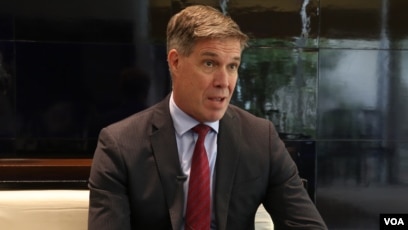
“Bilateral defense ties have undergone drastic setbacks over the past few years amid Cambodia’s growing closer security ties with China and political tensions surrounding Cambodia’s general elections last year.”PHNOM PENH —
[Editor’s Note: U.S. Department of Defense Deputy Assistant Secretary for South and Southeast Asia Joseph H. Felter visited Cambodia this week to discuss the restoration of military cooperation with Cambodia. Bilateral defense ties have undergone drastic setbacks over the past few years amid Cambodia’s growing closer security ties with China and political tensions surrounding Cambodia’s general elections last year. The senior Pentagon official sat down in Phnom Penh on Wednesday with VOA Khmer to discuss defense ties with Cambodia and the U.S. Indo-Pacific strategy aimed at dealing with China’s growing influence in the region.]
VOA: Can you tell us about this trip of yours to Cambodia?
Felter: That was special because this is my first trip to Cambodia in this capacity as the Deputy Assistant Secretary of Defense for South and Southeast Asia. It was also the first time we had a senior-level defense talk in quite some time in Cambodia – defense dialogue which took place on Tuesday hosted by Gen. Neang Phat [Ministry of Defense secretary of state].
VOA: Who did you meet on the Cambodian side and what issues did you discuss?
Felter: On Tuesday I met with Gen. Neang Phat. He was hosting with his senior members from his staff from the Ministry of Defense and the Cambodian military. Just today, we visited Ream Naval Base and met with Vice Admiral Ouk Seiha, commander of the base, and his staff.
VOA: Can you tell us what issues you raised with Cambodian officials?
Felter: Gen. Neang Phat is the secretary of state of the Ministry of National Defense. As part of the Defense Policy Dialogue, we discussed a range of issues like regional and international security, multilateral and bilateral cooperation. What I thought to be the most important part of our discussion on Tuesday with the Defense Policy Dialogue was mapping out a way forward to improve and enhance military-to-military cooperation between the United States and Cambodia to identify a way we can improve our defense ties and military cooperation.
VOA: We have seen many joint activities have been canceled due to the political situation in Cambodia. Have you brought this into discussions with Cambodian officials to find ways to restart them?
Felter: Yes, we have restarted on some levels. Encouragingly, Cambodia agreed to restart our POW/MIA [Prisoner of War/Missing in Action] cooperation and we find this very encouraging. Later this month we will have a joint on-field activity where we actually go out and do recovery operations of two missing pilots that we are searching for. So we find this very encouraging. Following this, we will be able to enhance our existing state partnership program. This is the partnership program with the Eisenhower National Guard that we will be sending many subject experts here to help the Cambodian military develop their peace-keeping skills. We know that Cambodia will participate in peace-keeping operations and missions around the world so we look forward to that. And there is a way forward beyond that. We will identify a number of activities that we can do to build on this military-to-military cooperation and enhance defense relationship. But to go down that path, we were clear in our discussion on Tuesday with Gen. Neang Phat that a number of things will have to happen on the Cambodian side that has to take initiative in areas of promoting national reconciliation, opening space for civil society and media. Some specific areas down that path include improving bilateral and multilateral exercises, restarting joint combined exchange training which we did in the past, the naval exercise CARAT (Cooperation Afloat Readiness and Training). Angkor Sentinel is another example.
VOA: Your call for release the of Kem Sokha, the opposition leader, is met with a negative response from Cambodian officials. What do you think about that?
Read More …វិភាគសេដ្ឋកិច្ចពីវិនិយោគចិននៅសកម្ពុជា / Chinese investments in Cambodia
Op-Ed: Phnom Penh Post
៣០ មេសា ២០១៨ / 30 April 2018
វិភាគសេដ្ឋកិច្ចពីវិនិយោគចិន នៅសកម្ពុជា / Chinese investments in Cambodia (*)
គេថាវិនិយោគចិន នៅប្រទេសកម្ពុជា ឈរលើកិច្ចសន្យា « ឈ្នះ ឈ្នះ » តែមានភាគីមួយទៀត ដែលទទួលការបង់ខាត គឺប្រជារាស្ត្រខ្មែរ
ថ្មីៗនេះ លោកនាយករដ្ឋមន្ត្រី ហ៊ុន សែន បានលើកតម្កើងវិនិយោគចិន នៅប្រទេសកម្ពុជា ថាមានប្រយោជន៍ធំធេងណាស់ សម្រាប់ស្រុកយើង។ តែខ្ញុំសូមធ្វើការកត់សម្គាល់ដូចតទៅ។
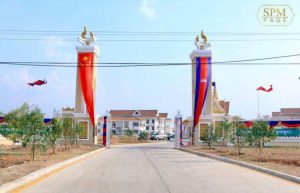
The entrance to Kratie University flanked with Chinese and Cambodian flags in a photo posted on Facebook last week.
បញ្ហាចម្បង ទាក់ទងវិនិយោគចិន នៅប្រទេសកម្ពុជា គឺការខ្វះតម្លាភាព ដែលនាំមកនូវអំពើពុករលួយ ទាំងខាងភាគីវិនិយោគិនចិន ទាំងខាងភាគីមន្ត្រីជាន់ខ្ពស់រដ្ឋាភិបាល។ គេថាវិនិយោគទាំងនេះ ឈរលើកិច្ចសន្យា « ឈ្នះ ឈ្នះ » សម្រាប់ភាគីទាំងពីរ តែមានភាគីមួយទៀត ដែលទទួលការបង់ខាត គឺប្រជារាស្ត្រខ្មែរ ដែលមិនមានសិទ្ធិសម្តែងមតិ។
សព្វដង វិនិយោគពីបរទេស តែងតែផ្តល់ការងារឲ្យប្រជាពលរដ្ឋក្នុងស្រុក តែចំពោះវិនិយោគចិន នៅប្រទេសកម្ពុជាវិញ គ្មានផ្តល់ការងារអ្វី ឲ្យប្រជាពលរដ្ឋខ្មែរទេ ពីព្រោះវិនិយោគិនចិន គេនាំពលកររបស់គេ មកពីប្រទេសចិន ហើយប្រាក់ខែបើកឲ្យពលករបរទេសទាំងនោះ ត្រូវផ្ទេរទៅប្រទេសចិនវិញ។
សព្វដងទៀត មានការផ្ទេរបច្ចេកវិទ្យា ពីប្រទេសជឿនលឿន មកប្រទេសអន់ថយ តាមរយៈវិនិយោគ ពីប្រទេសមួយទៅប្រទេសមួយ តែចំពោះវិនិយោគចិន នៅកម្ពុជា គឺគ្មានការផ្ទេរបច្ចេកវិទ្យាអ្វីមកស្រុកយើងទេ ពីព្រោះពួកចិន គេធ្វើអ្វីៗទាំងអស់តែខ្លួនគេ ហើយគេនឹងវិលត្រឡប់ទៅស្រុកគេវិញ ក្រោយពីបញ្ចប់ការដ្ឋានរបស់គេនៅស្រុកយើង។
ពេលដែលពលករទាំងអស់ ត្រូវបាននាំមកពីប្រទេសចិន ពលករខ្មែរ មិនមានឱកាសទទួលបានការបណ្តុះបណ្តាលវិជ្ជាជីវៈអ្វីទេ ហើយស្រុកយើងក៏គ្មានឱកាសអភិវឌ្ឍធនធានមនុស្សរបស់យើងឡើយ។ លោក ហ៊ុន សែន លើកឡើងថា វិនិយោគិនចិន ត្រូវតែនាំពលកររបស់គេ ពីស្រុកចិនមកប្រទេសកម្ពុជា ពីព្រោះស្រុកយើងខ្វះធនធានមនុស្ស ហើយមិនអាចរកពលករមានជំនាញវិជ្ជាជីវៈបានទេ។ ការលើកឡើងរបស់លោក ហ៊ុន សែន បែបនេះ មានន័យថាគាត់ចង់ឲ្យប្រទេសកម្ពុជា នៅតែអន់ថយជាងគេជានិច្ចកាល ដោយស្ថិតក្នុងភាពល្ងង់ខ្លៅ ភាពក្រីក្រ និងភាពរំពឹងលើគេជានិច្ចកាល។
យើងកត់សម្គាល់ថែមទៀតថា ប្រទេសចិន ផ្តល់ជំនួយឲ្យយើងដៃម្ខាង តែដៃម្ខាងទៀតគេប្រមូលពីយើងវិញយ៉ាងសន្ធឹកសន្ធាប់ តាមរយៈសម្បទានដីធ្លី សម្បទានព្រៃឈើ និងសម្បទានរ៉ែ និងតាមរយៈកិច្ចសន្យាចំណេញកប់ក្តោង ដោយគ្មានហានិភ័យអ្វី ដោយសារមានការធានា មិនឲ្យបង់ខាត ពីរដ្ឋាភិបាលកម្ពុជា ដូចជាក្នុងវិស័យវារីអគ្គិសនី ជាដើម។
ចំពោះទេសចរណ៍ មកពីប្រទេសចិនវិញ ក៏គេមិនត្រូវការពលករ និងអាជីវករខ្មែរដែរ ពីព្រោះក្រុមហ៊ុនចិន ជាអ្នកចាត់ចែងអ្វីៗទាំងអស់ សម្រាប់ទេសចរណ៍ចិន ដែលមកទស្សនាប្រទេសកម្ពុជា។ ដូច្នេះ ប្រជារាស្ត្រខ្មែរ មិនចំណេញអ្វីពីទេសចរណ៍ចិនទេ ដែលមកស្រុកយើងភ្លូកទឹកភ្លូកដី តែប្រទេសកម្ពុជាទទួលការបង់ខាត ផ្នែកបរិស្ថាន និងសង្គម ដោយសារទេសចរណ៍បែបនេះ។
លោក ហ៊ុន សែន គាត់ត្រូវការការគាំទ្រពីប្រទេសចិន ដើម្បីជួយការពាររបបផ្តាច់ការ និងពុករលួយរបស់គាត់ ពីព្រោះប្រទេសចិន មិនគិតពីប្រជាធិបតេយ្យ សិទ្ធិមនុស្ស និងអភិបាលកិច្ចល្អទេ នៅស្រុកណាដែលគេមកវិនិយោគ។ តែចំពោះលោក ហ៊ុន សែន គាត់បង្ហាញពីកង្វះខាត ក្នុងការយល់ដឹងក្នុងវិស័យសេដ្ឋកិច្ច ហើយគាត់ក៏មិនអើពើ ពីផលប្រយោជន៍ប្រទេសកម្ពុជាឡើយ។
សម រង្ស៊ី
ប្រធានចលនាសង្គ្រោះជាតិ
(*) The Phnom Penh Post, 30 April 2018
Chinese investments in Cambodia are win-win-lose, and guess who’s the loser
By Sam Rainsy
Editor,
Following The Post’s article titled Hun Sen comes to China’s defence, praises investment and development aid (April 26), I would like to make the following remarks.
The main problem with Chinese investments is their complete lack of transparency, which favours corruption among both Chinese investors and Cambodian government officials. These investments generally consist of “win-win-lose” arrangements, with the Cambodian people being the silent loser.
Present Cambodia’s Conundrum and Its Foreseeable Future
Preamble:
This upcoming election of Senate in February 25, 2018 and national election in July 29, 2018 are very questionable on its legitimacy as the key voters of largest opposition party CNRP (tantalizing of 5007 councillors) have been redistributed to other parties especially to the government-led party CPP and the dissolution as well as the banning of 118 core members of the CNRP. The excuse of law ratifying to redistributing seats (both law-makers in the parliament and the lower governance apparatus commune-Sangkat councillors) has been outraged by both the providence of such law amending and nationwide errs. More than that, the international community has ever come to shoulder to respond to this systemic crackdown on the state of democracy and human rights brokering since the first election in 1993 sponsored by the UNTAC.
The strength on his political manoeuvring of Prime Minister Hun Sen through the backing of China and the resistance to reinstating back to the original course from both Cambodian nationals and international community are likely not in equilibrium. Thus, pragmatists see that this imbalance will lead to an uncontested solution.
The Hun Sen’s Strength:
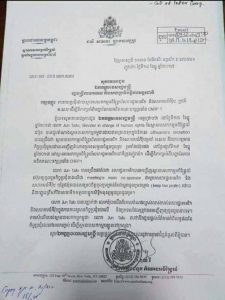
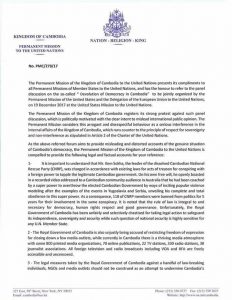
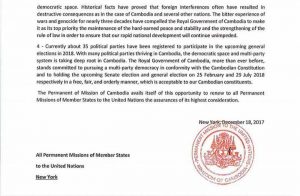
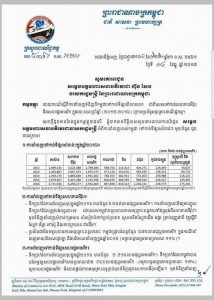
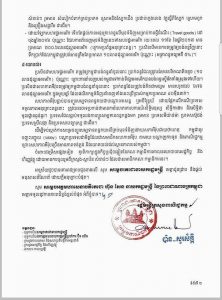 Prime Minister Hun Sen has been known for his relentless and successful manoeuvring the tactic of “divide and conquer” on his several political contenders. With the increasing of votes towards the opposition CNRP in both national election 2013 and commune-Sangkat election in 2017, the preparedness and implementation on the dissolution of this largest opposition party has been undertaken. There were no doubts on the amendments by single party (CPP) on several laws such as NGOs laws (LANGO), law of labours unions, law of the press and media (sic), and three times adjustment of the law on political party etc. Mixing his repeated warnings on war if he lost the election to these efforts on law amendments to sideline his opponent is a concerted effort to substantiate the facade of democracy in Cambodia.
Prime Minister Hun Sen has been known for his relentless and successful manoeuvring the tactic of “divide and conquer” on his several political contenders. With the increasing of votes towards the opposition CNRP in both national election 2013 and commune-Sangkat election in 2017, the preparedness and implementation on the dissolution of this largest opposition party has been undertaken. There were no doubts on the amendments by single party (CPP) on several laws such as NGOs laws (LANGO), law of labours unions, law of the press and media (sic), and three times adjustment of the law on political party etc. Mixing his repeated warnings on war if he lost the election to these efforts on law amendments to sideline his opponent is a concerted effort to substantiate the facade of democracy in Cambodia.
With current state of international competitiveness, China publicly announced its support of the dissolution of the CNRP as well as other jailing and threats on the opposition members. The narrative of colour revolution has been made and publicized at large to apply the course of jailing Kem Sokha, president of the CNRP, and the judgement of the Supreme Court to dissolve the CNRP with the conviction of colour revolution to topple a legitimate government.
In hand, Hun Sen has comforted his zone through high ranking positioning of arm-force from his children, to relatives, and to closest loyalists, on key responsibility such as the bodyguard units, the intelligent police, the national police, the military police, and the army. The coffer’s pockets are full of loyal Oknha (entitlement of Lord to cementing patronage beaurocrats of oligarchy) and the key position of treasurers (money’s controllers) of his trust. The governance system of spreading his loyalists to key positions such as the Royal Palace, the Assembly, the Senate, and the Judiciary, the state’s human rights body, the state’s anti-corruption unit, etc., is tangible.
The Convincible Strength:
The dissolution of the CNRP and the redistributing all those seats is comfortably with no distress of reprisal is known as the physical “winning” of the battle while the destruction and violation on the rule of law as well as the disrespectful to the half-nationwide-population voice of the Cambodian people is the moral “defeating” of the war. The domestic outcry of the people levelling at the state of silence is one of the testimonies of their political maturity. They are silently ready to exercise their voice through secrete ballots. The international community representing over 70% of the earth surface has come out with concrete actions and action-plans to respond to Hun Sen’s manoeuvring.
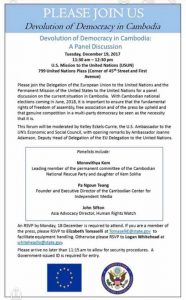
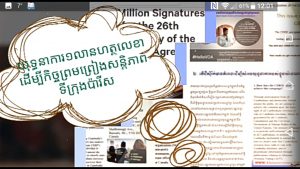 Led by the US and EU, the sanction on individuals of the powerful elites of Hun Sen’s administration is not sufficient. The effort to call for the reconvening of the signatory countries of the Paris Peace Agreements is on pending. It is no doubt that H.E. Pan Sosak, Minister of Commerce, wrote a letter to Prime Minister Hun Sen to tell him the truth on the impact of trade loss sanctioned by the US and EU. It is no doubt that H.E. Tuy Ry, Cambodian commissioner to the United Nations, wrote letter to the Minister of Foreign Affairs on an invitation to join the discussion among permanent member states led by the US and EU at the United Nations this December 19, 2017. It is no doubt that Prime Minister Hun Sen has come out with different scenarios for the reviving of the opposition party by suggesting them to create a new party.
Led by the US and EU, the sanction on individuals of the powerful elites of Hun Sen’s administration is not sufficient. The effort to call for the reconvening of the signatory countries of the Paris Peace Agreements is on pending. It is no doubt that H.E. Pan Sosak, Minister of Commerce, wrote a letter to Prime Minister Hun Sen to tell him the truth on the impact of trade loss sanctioned by the US and EU. It is no doubt that H.E. Tuy Ry, Cambodian commissioner to the United Nations, wrote letter to the Minister of Foreign Affairs on an invitation to join the discussion among permanent member states led by the US and EU at the United Nations this December 19, 2017. It is no doubt that Prime Minister Hun Sen has come out with different scenarios for the reviving of the opposition party by suggesting them to create a new party.
For trade alone, Cambodia can face trade loss up to 75% for its national revenue earned from trade. This huge wealth of exporting major garment and agriculture products to the market in the US and EU have fed the government, the mouth of Oknhas, as well as the hundred thousands garment workers. There are some explanations to seek substitutes to these losses, but in fact, the pain of individual’s visa ban and asset freezing widening to this trade sanctioning etc., is not yet substantial to the loss of political recognition and legitimacy at the present as well as the future.
At least, one year length that UNs postponed the seat of Cambodia during the coupe detat in 1997. When the political normality was turned to its course, the seat was returned. This time, the crackdown on democracy is tantamount that no one can underestimate the severe reprisal if political normality is not turned to its level.
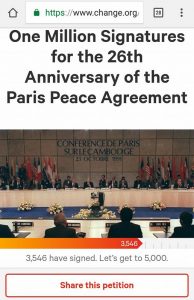 Domestically, Cambodian population at large has emerged the youngest bulk representing 65% with under 35 years of age. This generation is self-determination seekers, rebellious to entrenching injustice, and championing of the political maturity. Nevertheless, Cambodians overseas who have been known for their advocacy and campaign for the Paris Peace Accords in 1991, have ever come together in the largest force to pushing for democracy improvement in Cambodia. On the International Human Rights Day 10 December 2017, they have travelled from different corners of North America in unison to the White House in Washington DC. to voice their concerns. Thousands of signing of Cambodian people signed www.change.org for the reviving of the Paris Peace Agreements. Legally, political, and economical, Cambodia government is an entity of binding with international community standard, this entity is not solely under Cambodia constitution, but no one can manipulate it for the sake of personal wealth and power at all.
Domestically, Cambodian population at large has emerged the youngest bulk representing 65% with under 35 years of age. This generation is self-determination seekers, rebellious to entrenching injustice, and championing of the political maturity. Nevertheless, Cambodians overseas who have been known for their advocacy and campaign for the Paris Peace Accords in 1991, have ever come together in the largest force to pushing for democracy improvement in Cambodia. On the International Human Rights Day 10 December 2017, they have travelled from different corners of North America in unison to the White House in Washington DC. to voice their concerns. Thousands of signing of Cambodian people signed www.change.org for the reviving of the Paris Peace Agreements. Legally, political, and economical, Cambodia government is an entity of binding with international community standard, this entity is not solely under Cambodia constitution, but no one can manipulate it for the sake of personal wealth and power at all.
Political turmoil may threaten Cambodia’s hard-won economic achievements
Thank you very much Mr. Weijia for your well-balanced argument between modern political economy and pure win-win one man show strategy of Prime Minister Hun Sen. As said, China has claimed her achievements are through China’s model of political economy, corruption-free state-of-the-arts, and global-oriented approach leadership of President Xi. All these are non-existence in Cambodia PM leadership, which shall pose great risk for China in its global role achievement as articulated by President Xi if China has privately or publicly backed the current moves of Cambodia government.
Op-Ed: Global Times
Political turmoil may threaten Cambodia’s hard-won economic achievements
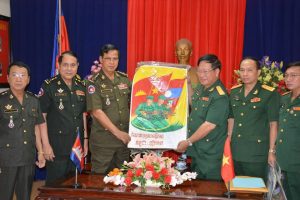
Arts Exchange Program between VN, Cambodia and Lao on theme of Military Cooperation. (Photo Courtesy monoroom.com dated October 25, 2017 or http://hrkhnews.com/?p=7419)
A close watch needs to be kept on the tense political situation in Cambodia, which is a popular destination for Chinese investors. The Southeast Asian country has experienced strong economic growth in recent years, but its success may be threatened by possible political turmoil.On Friday, the IMF gave a positive appraisal of Cambodia’s economy, saying it is expected to grow by 6.9 percent this year. Having graduated from a low-income to a lower middle-income country, Cambodia seems confident in transforming itself into an upper middle-income economy by 2030 and a high-income country by 2050. Domestic and foreign observers alike have optimistic views of the nation’s economy.
However, rapid economic growth tells only part of the story; the other part is domestic political uncertainty.
According to the Financial Times, Cambodian Prime Minister Hun Sen warned earlier this year that his country could descend into civil war. Over the past few weeks, tension escalated after Sam Rainsy, the former president of Cambodia’s opposition, was arrested and charged with treason for allegedly conspiring with a foreign power to overthrow the Hun Sen administration.
Political stability is a necessity for a nation to prosper and develop, especially a country like Cambodia, whose economy has traditionally been supported by tourism and garment exports.
Letting the situation in Cambodian deteriorate would scare off foreign tourists and investors and deal a heavy blow to the local economy.
Last week, the US renewed a call for the Hun Sen administration to release the country’s opposition leaders.
Cambodia-US relations are strained, and the possibility of US sanctions against garment imports from Cambodia cannot be ruled out. Criticism from Western countries may cast shadows over Cambodia’s economic future.
Appropriate solutions are needed to avoid a further escalation of tension and even conflict. Economic growth in recent years was a hard-won achievement for Cambodia and the growth trend should not be interrupted by the country’s rising political tension. People should become more aware of the importance of political stability to protect the results of economic development.
As an important economic partner of Cambodia, China will pay close attention to the situation in the Southeast Asian country and willingly provide the necessary help.
The author is a reporter with the Global Times. bizopinion@globaltimes.com.cn
Sweden threatens to review engagement with Cambodia
Sweden threatens to review engagement with Cambodia
Op-Ed: Reuters
PHNOM PENH (Reuters) – Sweden said on Thursday it would rethink its engagement with Cambodia if the main opposition party is dissolved, in the strongest warning yet from a Western aid donor.
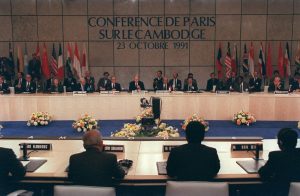 The government has filed a suit to dissolve the Cambodia National Rescue Party (CNRP) after charging its leader, Kem Sokha, with treason. He rejected the charge as politically motivated.
The government has filed a suit to dissolve the Cambodia National Rescue Party (CNRP) after charging its leader, Kem Sokha, with treason. He rejected the charge as politically motivated.
Excluding the opposition party would allow veteran Prime Minister Hun Sen a clear field to extend his 32-year rule at the next election in 2018.
Swedish Human Rights Ambassador Annika Ben David told a news conference at the end of a five-day visit the banning of the opposition party could have consequences.
“Should the Cambodia National Rescue Party be dissolved, this will force my government to rethink our engagement Cambodia,” she said.
Other Western countries have condemned the arrest of Kem Sokha and warned against dissolving the CNRP, but have not raised the possibility of action.
David did not elaborate on what Sweden might do.
Government spokesman Phay Siphan rejected David’s comments as interference in Cambodia’s sovereignty and an insult.
“This is language that the royal government can’t accept,” Phay Siphan told Reuters. “This is an invasion and insult to the Cambodian national institution.”
Sweden had given Cambodia an estimated $100 million in aid over five years, David said. According to Cambodia’s database of donors, Sweden ranked third for aid among individual EU member states last year after France and Germany.
David also pointed out that Swedish fashion group H&M was an important buyer of clothes from Cambodia’s garment factories – the country’s main export earner.
Hun Sen’s ruling Cambodia People’s Party (CPP) has launched a crackdown on its critics, including politicians, independent media and non-government groups.
This week, parliament changed the law so that the CNRP’s seats can be shared amongst other parties if it is dissolved.
While Western governments have for years tried to put pressure on Cambodia over the stifling of democracy and the trampling of human rights, China has become an increasingly important ally and business partner.












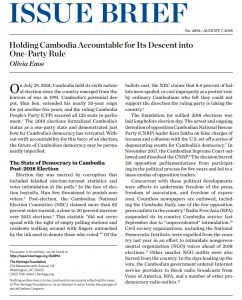
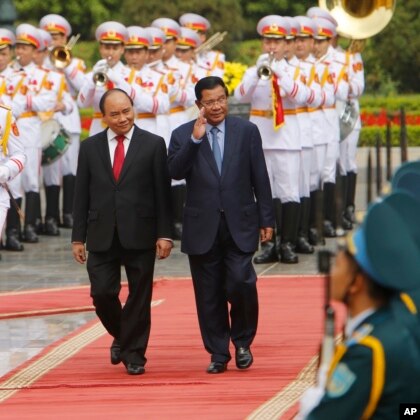
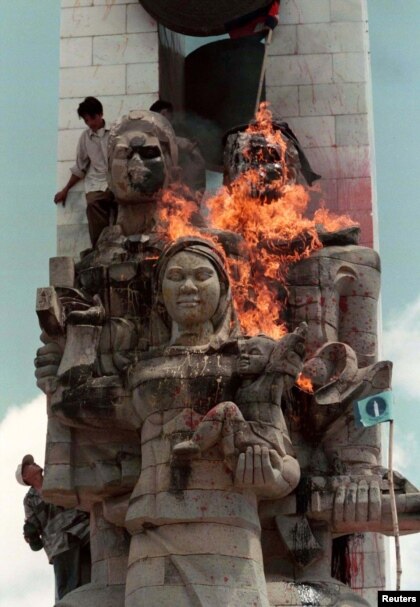

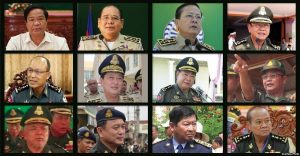
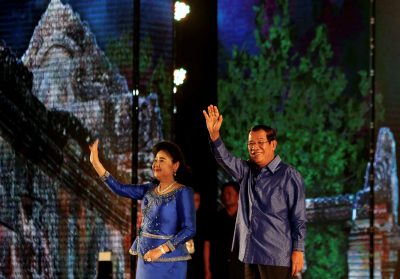 A high voter turnout would smooth Cambodian Prime Minister Hun Sen’s path to establishing a new authoritarian order. The government has indicated that it is
A high voter turnout would smooth Cambodian Prime Minister Hun Sen’s path to establishing a new authoritarian order. The government has indicated that it is 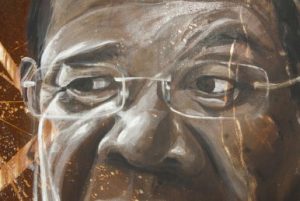
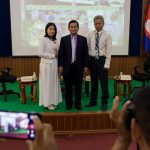
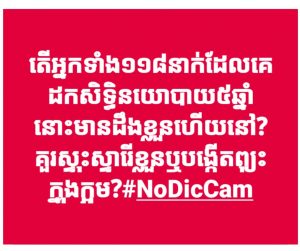
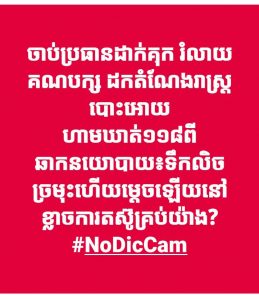

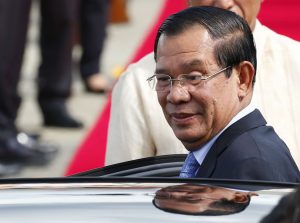
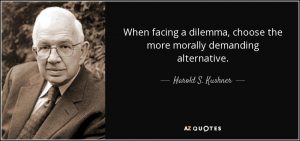
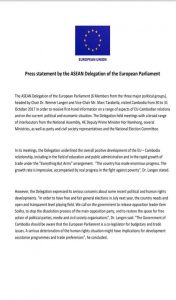
 Cambodian politics reached a new boiling point with the arrest of the opposition leader last week. Kem Sokha was handcuffed in the middle of the night in his house and accused of “treason” by the government.
Cambodian politics reached a new boiling point with the arrest of the opposition leader last week. Kem Sokha was handcuffed in the middle of the night in his house and accused of “treason” by the government.